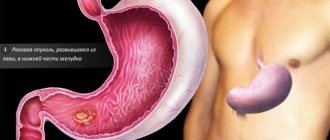Diarrhea (or frequent, watery, loose stools) can be a symptom of many diseases. What causes diarrhea? How to stop diarrhea? We will dwell on all these issues in detail in our article.
Diarrhea not only causes intestinal discomfort and an unusual “attachment” to the toilet. This symptom signals “problems” in the body and impaired absorption of water and other nutrients in the intestines.
During a day of diarrhea, a person experiences a large amount of fluid and microelements, which leads to water-electrolyte imbalance, kidney and heart failure.
Can there be diarrhea for no reason? Doctors believe that there is always a reason.
Causes of diarrhea:
- infectious diseases;
- chronic diseases of the digestive system (colitis, pancreatitis);
- dysbacteriosis;
- impaired intestinal absorption (malabsorption syndrome);
- irritable bowel syndrome (IBS);
- allergy;
- Crohn's disease;
- lactose intolerance;
- acute poisoning;
- bowel resection;
- chemotherapy, radiation therapy for cancer;
- uncontrolled use of medications.
What other common signs of diarrhea appear?
Symptoms are primarily associated with problems with the digestive system: as a rule, bloating, abdominal pain, and frequent urge to go to the toilet.
Forms of diarrhea
Acute diarrhea has a bacterial, viral, or parasitic cause. For example, viral diarrhea is caused by enteroviruses. The disease most often occurs when drinking contaminated water and food and lasts about 3 to 4 weeks.
The frequency of bowel movements and the degree of dehydration depend on the state of a person’s defenses and the degree of “friendliness” of the pathogen that has entered the body. Diarrhea is accompanied by an increase in body temperature up to 40°C. With food allergies, diarrhea is accompanied by skin rashes.
- severe diarrhea can occur with salmonellosis, dysentery, cholera;
- Chronic diarrhea is often associated with chronic diseases and lasts more than a month, and sometimes for years. Diarrhea can occur after taking medications for a long time. For example, laxatives, antiarrhythmics, but diarrhea after antibiotics is more common.
Often chronic diarrhea is the cause of weight loss, anemia, and vitamin deficiency.
Now let's talk about what features acute diarrhea has and the variety of its manifestations.
Risk factors and groups
More often, diarrhea is diagnosed in children under 5 years of age, which is associated with the developmental characteristics of the child and due to unconscious neglect of hygiene rules.
Also at risk:
- Elderly people, due to decreased immune activity, due to age-related changes occurring in the human body.
- Citizens with chronic pathologies of the digestive system, if the condition is not compensated by medications.
- Travelers, due to frequent changes in climatic conditions and the need to visit various catering establishments that do not always comply with sanitary standards.
- People with infectious diseases, including HIV patients. A weakened body is unable to fully digest and absorb nutrients.
- Workers of social institutions and medical personnel caring for patients suffering from infections of the digestive system are also at risk.
- People suffering from alcohol addiction, as well as those who periodically dismiss the appearance of signs of irritable bowel syndrome, also face manifestations of functional diarrhea. Then diarrhea gives way to constipation.
In principle, any person suffering from digestive disorders, stress, or nervous strain can be included in the risk group.
Acute diarrhea
Diarrhea begins suddenly, like a bolt from the blue. Acute diarrhea is accompanied by frequent bowel movements, up to 8-10 times a day, pain in the stomach, bloating and nausea.
Acute diarrhea leads to dehydration, general weakness, dry skin, and decreased appetite.
Diarrhea with water
Watery diarrhea is a common symptom of cholera. This severe infectious disease is accompanied by repeated vomiting, profuse diarrhea and severe dehydration.
Intestinal infections are often accompanied by a classic pair of symptoms: diarrhea and fever. This can happen, for example, with the gastrointestinal variant of salmonellosis.
The disease begins acutely, accompanied by foul-smelling watery diarrhea, profuse vomiting and fever up to 38°C. The patient experiences joint pain, chills, headache, and convulsions. With the typhoid-like variant of salmonellosis, a rash appears on the skin, the liver and spleen become enlarged.
Diarrhea and fever
These symptoms usually accompany a chronic parasitic infection - giardiasis.
Viral intestinal infection is one of the causes of diarrhea in a child under two years of age. In adults, viral diarrhea is less common, because their immunity is much stronger. Along with diarrhea, patients have a runny nose, sore throat when swallowing, dry cough, and fever. For this, the disease received its popular name - “intestinal flu”.
The well-known disease tuberculosis can affect not only the lungs, but also the intestines. The disease is manifested by sweating, diarrhea, a slight increase in temperature, bloating, and general malaise.
Diarrhea and vomiting
Before us is a classic combination of symptoms of acute food poisoning. Foodborne toxic infections are also accompanied by vomiting, dry mouth, dizziness and a decrease in the amount of urine excreted.
Viral hepatitis A begins acutely and violently. Jaundice, dark urine, diarrhea, pain in the joints of the extremities, vomiting, and fever appear.
Main symptoms
Watery stool is common in children
When visiting a doctor, it is important to be honest about your symptoms. The process and result of treatment depends on this. Typical signs of secretory diarrhea:
- Liquid, partial, watery bowel movements – from 5 to 10 liters per day
- No noticeable stench
- Almost complete absence of signs of intoxication
- Pain syndrome is not observed or is mild
- The temperature rises slightly - to a maximum of 37.8 °C
- No false urge to defecate
- Fasting does not help stop diarrhea
- There are high levels of sodium chloride in the stool - the composition is similar to blood plasma
- There are no leukocytes or blood clots in the stool
- Low levels of potassium ions in the blood - because of this, the patient may experience seizures
Chronic diarrhea
The most common cause of chronic diarrhea is chronic illness. In order to prescribe adequate treatment, the doctor needs to clarify the cause of the problem. For example, two weeks of treatment for pneumonia can lead to diarrhea after antibiotics.
Immunity disorders lead to Crohn's disease. All parts of the intestine are affected. The disease is manifested by abdominal pain, diarrhea and flatulence. There are also extraintestinal manifestations of the disease: inflammation of the mucous membranes of the eyes and mouth, anemia, fever, weight loss.
In chronic pancreatitis, there is pain under the left hypochondrium, and vomiting is bothersome and does not bring relief. The disease is accompanied by foul-smelling watery diarrhea and bloating. Since the digestive function of the pancreas is affected, undigested food particles and fatty inclusions may be found in the stool.
Diarrhea without an infectious onset associated with stressful situations and depression is called “functional intestinal diarrhea.”
Stool streaked with blood can occur both with rectal cancer, with damage to the mucous membrane by bacteria, and with acute viral diarrhea.
Chronic gastritis is accompanied by impaired digestion of food. This results in diarrhea, nausea, bloating, pain in the upper abdomen, vomiting and belching. Quite often, the cause of gastritis and peptic ulcers is Helicobacter, a microbe that thrives in gastric juice.
Peptic ulcer disease affects the stomach and duodenum. Abdominal pain depends on food intake. When the ulcer is located in the intestine, the pain is “hungry” and stops after eating. With a stomach ulcer, pain occurs after eating. In addition to pain, the disease is accompanied by heartburn, diarrhea, nausea, and poor appetite. Exacerbations are more common in spring and autumn.
Malabsorption syndrome is characterized by constant loose stools, bloating, foul-smelling gases, weight loss, general weakness, dry skin, drowsiness, stomatitis and inflammation of the tongue.
Irritable bowel syndrome has two variants: with diarrhea and with constipation. With the “diarrheal” variant, the patient has watery stool mixed with mucus, bowel movements are frequent, and there are false urges to recover. Depression, anxiety, and poor sleep are often noted.
By the way, diarrhea occurs not only with diseases of the digestive system!
This symptom occurs with thyrotoxicosis - increased function of the thyroid gland. In such cases, diarrhea is accompanied by a number of other symptoms: palpitations, an increase in the size of the thyroid gland (goiter), slight trembling of the fingers, weight loss, and bulging eyes.
Another disease accompanied by diarrhea is celiac disease. The disease develops due to congenital food intolerance and manifests itself in the first year of life. In response to the introduction of complementary foods (flour), the child develops diarrhea, foamy stool, with a pungent odor, and a greasy consistency. The child refuses food, becomes lethargic, loses weight, and develops dystrophy.
Diarrhea during pregnancy deserves special attention. Loose stools can be one of the manifestations of early toxicosis, because food preferences change, and some combinations of foods can cause diarrhea. Diarrhea can be caused by hormonal changes in the female body. Such diarrhea during pregnancy does not require drug treatment, only diet for diarrhea is important.
If diarrhea is associated with intestinal infections, the doctor will prescribe treatment taking into account the harmlessness of the drug to the fetus.
Diarrhea in a child can be associated with teething, lactose deficiency, or food allergies.
Diarrhea can also be caused by intestinal infections - “unwashed hand diseases”, food poisoning, intolerance to artificial formula.
Travelers' diarrhea occurs in tourists during a sudden change in climate, as well as after eating exotic dishes of local cuisine or low-quality products.
Diagnostics
Diagnosis of diarrhea in adults and children begins with the collection of complaints and examination. Dehydration can result in decreased blood pressure, palpitations, muscle cramps, and dry skin. Instrumental studies are prescribed:
- colonoscopy - examination of the large intestine using an endoscope;
- gastroscopy - examination of the stomach using a gastroscope;
- sigmoidoscopy - endoscopic examination of the rectum;
- ultrasound examination of the abdominal organs;
- CT scan;
- X-ray examination of the intestines.
Laboratory methods allow you to establish a diagnosis and clarify the cause of diarrhea:
- coprogram;
- general clinical blood test;
- stool analysis for helminth eggs, Giardia cysts;
- bacteriological culture of stool (diarrhea after antibiotics);
- blood tests to identify markers of inflammation, hormones, liver and pancreas enzymes;
- blood tests for viral hepatitis.
Diet for diarrhea
What to eat for diarrhea?
Proper nutrition plays an important role in the treatment of diarrhea. For diarrhea, boiled and steamed dishes are recommended. Nutritionists recommend eating slimy soups, wheat crackers, rice porridge, and baked potatoes for diarrhea. Be sure to replenish fluids.
It is better to give up fatty foods, alcohol, milk, sweets, fruits, spices and black bread.
A diet for diarrhea involves eating in fractional portions, 5-7 times a day.
In a bottle-fed child, the diet for diarrhea consists of replacing the formula and temporarily stopping complementary feeding. If a child who is breastfed has upset bowel movements, it is advisable for the woman to continue feeding. A nursing mother should follow a strict diet if her baby has diarrhea.
For celiac disease, a lifelong gluten-free diet is prescribed. Excluded from the diet: all products made from rye, wheat flour, cereals, bread, kvass, beer.
What can you eat if you have diarrhea so as not to cause harm?
- cutlets, steamed meatballs from lean meats;
- cereal porridges - “smudges”;
- slimy soups, puree soups;
- baked or boiled vegetables;
- bananas or baked apples.
Treatment tactics
Diet and even fasting as a treatment for diarrhea
The choice of treatment depends on the causes of the disease:
- Diet is a prerequisite for recovery
- Detoxification measures - if the cause of diarrhea is due to the effects of medications or toxic drugs
- Antibiotics – if the disease is caused by bacteria
- Rehydration - replenishing fluid loss
- Drugs to restore normal intestinal motility
If, during examination, tumor neoplasms are revealed, the patient is referred to a doctor of an advising profile - an endocrinologist, oncologist-gastroenterologist. In this case, without treating the underlying disease, secretory diarrhea cannot be stopped. All medications are prescribed by the attending physician and selected individually.
The length of use of antibacterial agents depends on the severity of the disease and can last up to 2 months.
How to treat diarrhea?
Medicines for diarrhea are prescribed by the doctor in accordance with the diagnosis. You should not self-medicate, because diarrhea can be a sign of various diseases.
It is imperative to go to the hospital if diarrhea continues for a week or more, if there is blood and mucus in the stool, black stool, abdominal pain, fever, diarrhea.
Treatment in adults is carried out by an infectious disease specialist, gastroenterologist, or therapist after the necessary studies.
Appointed:
- antibiotics for diarrhea of microbial origin;
- enzyme tablets for diarrhea with insufficient functioning of the pancreas and liver;
- anti-diarrhea medications that improve absorption in the small and large intestines;
- a medicine for diarrhea that improves intestinal motility;
- sulfa drugs for diarrhea;
- astringents and coatings for diarrhea;
- an antidiarrhea remedy that restores intestinal eubiosis;
- anti-diarrhea tablets;
- An anti-diarrhea drug is administered intravenously to restore water-salt balance;
- enterosorbents. A cure for diarrhea in adults and children that has been proven over the years is Enterosgel sorbent;
- at home, in adults with dehydration, saline solutions are used for oral administration.
Enterosgel not only promotes the absorption of excess fluid in the intestinal lumen, but also absorbs toxic metabolic products, restores normal intestinal flora, and prevents dehydration.
Diarrhea after antibiotics does not always require drug treatment. Normal microflora is restored on its own within 7 - 10 days.
Treatment in adults at home is carried out for mild cases of the disease. In some places, folk remedies are still used - decoctions of medicinal plants - but with the widespread availability of modern enterosorbents, this is becoming less and less common.
Advantages of cooperation with our network of clinics
The IMMA network of medical clinics offers extremely high European standards of private medicine at affordable prices.
Among our main competitive advantages are:
- An impeccable market reputation and reviews from satisfied customers;
- A huge staff of experienced qualified doctors;
- Progressive treatment methods;
- Availability of imported effective drugs and diagnostic equipment;
- Free consultations on any questions before making an appointment;
- Possibility of providing one-time treatment or examination or concluding an agreement for ongoing medical care at a more affordable price;
- Transparent pricing policy and affordable fixed prices for the entire range of services;
- Availability of a unified information and analytical system;
- Availability of 6 medical and outpatient facilities in different areas of the city;
- Providing assistance at home;
Help desk service available 24/7.
Preventive measures against diarrhea
Nothing supernatural! All you need is:
- maintain personal hygiene;
- Before eating vegetables and fruits, they should be washed thoroughly;
- do not eat foods of dubious quality or with expired expiration dates;
- heat treat fish and meat;
- do not drink raw water of unknown origin;
- follow food storage rules;
- keep kitchen utensils clean;
- Avoid eating foods that cause an allergic reaction.
Be healthy!







